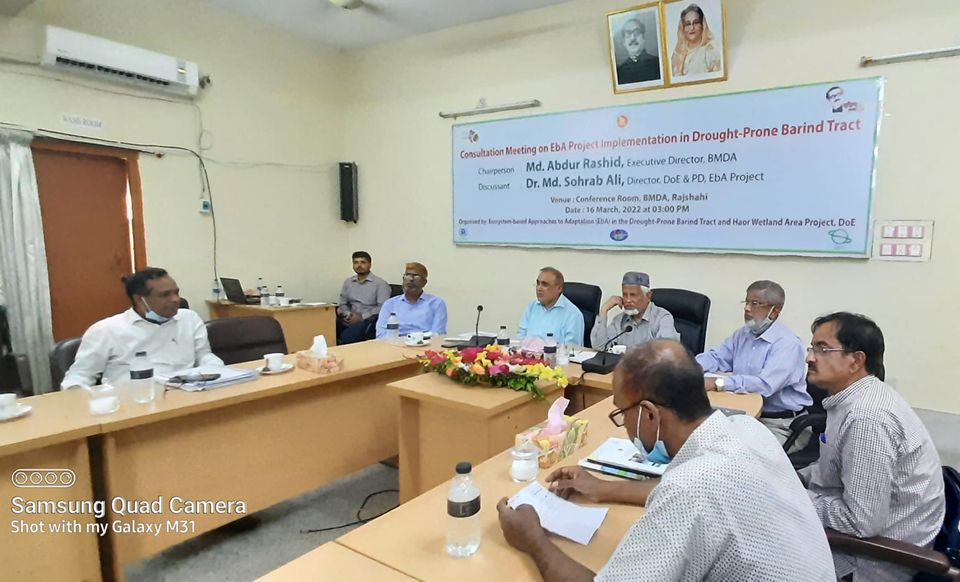
RAJSHAHI, March 17, 2022 (BSS) - Ecosystem-based approaches to adaptation in
drought-prone Barind Tract are crucial to protect its major farming system
from the adverse impact of climate change.
Climate change has already started posing a serious threat to the vital
sectors like agriculture, fisheries, forestry, livestock, health and
sanitation in the high Barind tract. So, there is no alternative to adopt
effective measures to address the odd situation.
Emphasis should be given on integrated water resource management, besides
creating a mass awareness about judicious use of both surface and underground
water for reducing the pressure on groundwater table in the dry area.
The observation came at a consultation meeting on EbA project
Implementation in drought-prone Barind Tract here yesterday.
Ecosystem-based Approaches (EbA) to Adaptation in the Drought-prone Barind
Tract project under the Department of Environment (DoE) organised the
consultation at the conference hall of Barind Multipurpose Development
Authority (BMDA) in Rajshahi city.
Former secretary Dr Zahurul Karim and DoE Director Dr Sohrab Hossain
addressed the meeting as resource persons, while BMDA Executive Director
Engineer Abdur Rashid was in the chair.
BMDA Additional Chief Engineer Dr Abul Kashem, Superintending Engineers
Shamsul Huda and Abdul Latif and Project Director Rafiqul Islam also spoke.
The meeting was told that optimum aquifer recharge in the Barind tract is
very important to protect its existing agricultural ecosystem through
managing a groundwater basin efficiently and effectively.
The drought-prone area is turning into an extreme drought zone owing to
scarcity of water due to the adverse impact of climate change and other
environmental degradations.
Dr Zahurul Karim said promotion of managed aquifer recharge can be the
vital means of halting furthermore declining of ground water level in the
high Barind area.
He said time has come to create awareness to halt the alarming decline of
the groundwater layer. Aquifer recharge activities should be promoted at
household level side by side with various institutions and industries
artificially.
Abdur Rashid said the BMDA has re-excavated 33257 ponds, 2063-kilometer
canals and 572 dug wells through implementation of various projects in order
to promote surface water-based irrigation till June last.
"We have a plan of elevating the surface water-based irrigation to 30
percent from the existing ten percent by 2030 in order to lessen the
gradually mounting pressure on underground water," Engineer Rashid said.
Around 715 more derelict ponds and 10 other big closed water bodies are
being brought under re-excavation aimed at making those suitable for using to
both irrigation and household purposes in the region.
Upon successful implementation by December in 2023, the project will
create scope of providing irrigation to 3,058 hectares of farming fields for
yielding around 18,348 tonnes of additional crops yearly.
In addition, the scope of producing 1,088 tonnes of additional fish will
be created through the conserved water.
Engineer Rashid said the initiative will contribute a lot towards
improving surface water resources besides aquifer recharge in the drought-
prone areas.
It will also help reduce the gradually mounting pressure on underground
water side by side by encouraging the people to boost the farming of fish and
duck after the best uses of the conserved water.